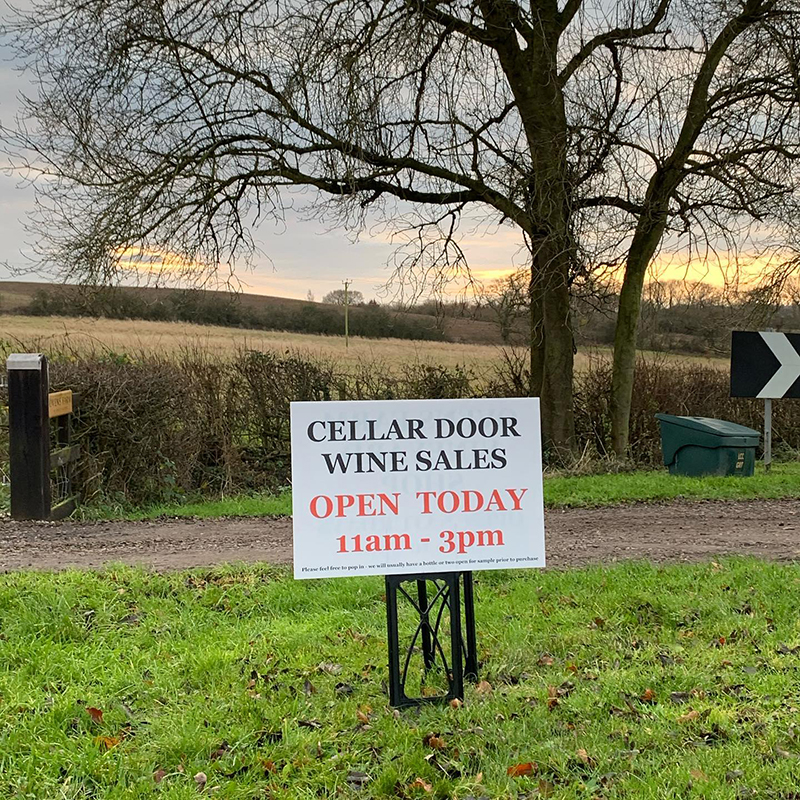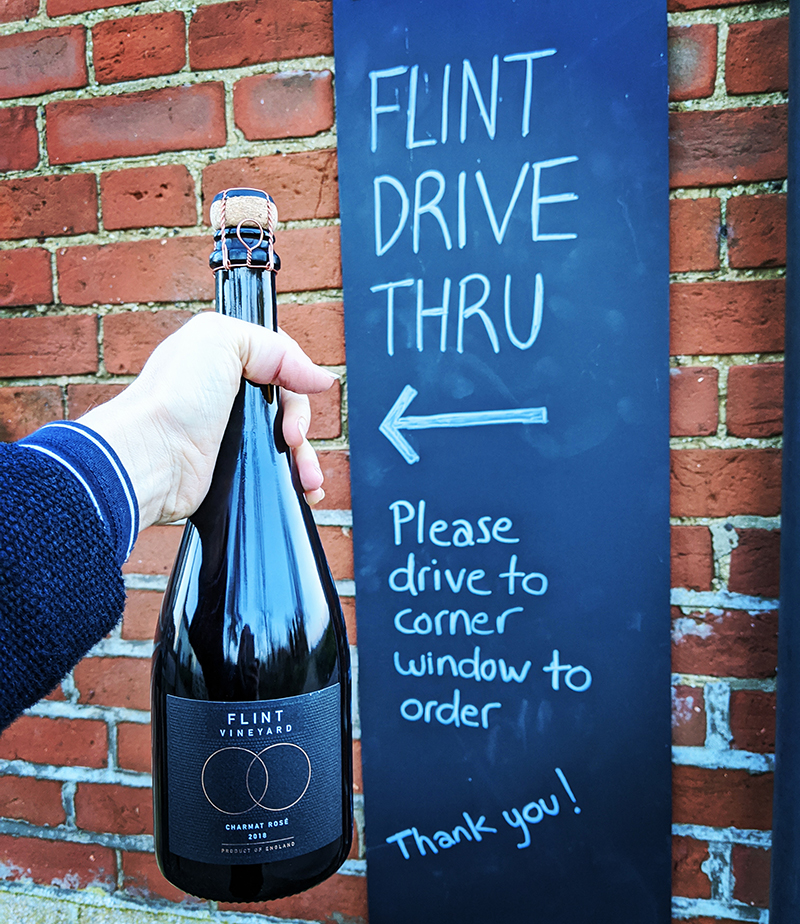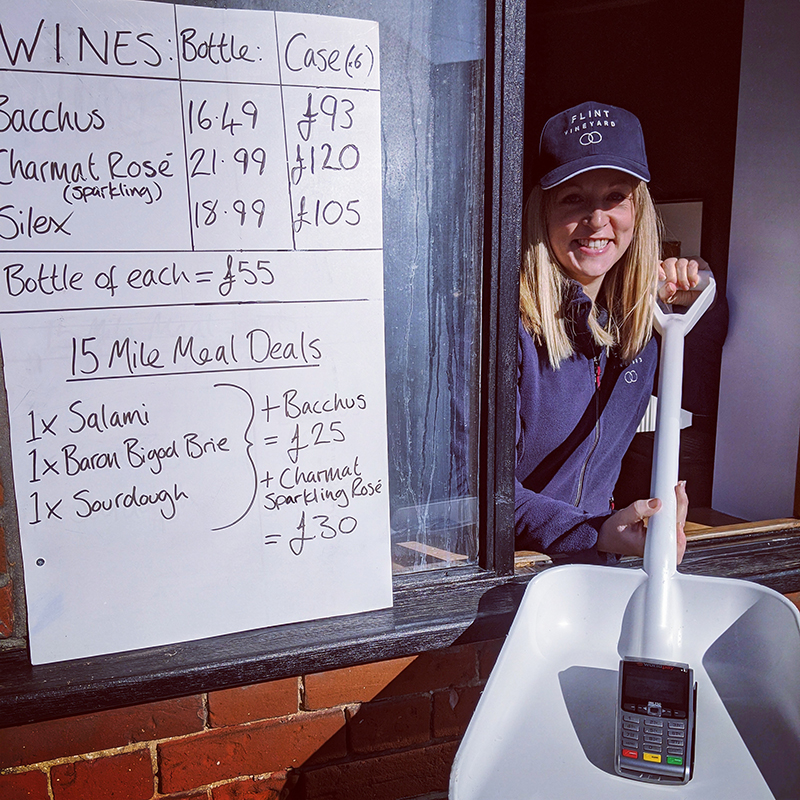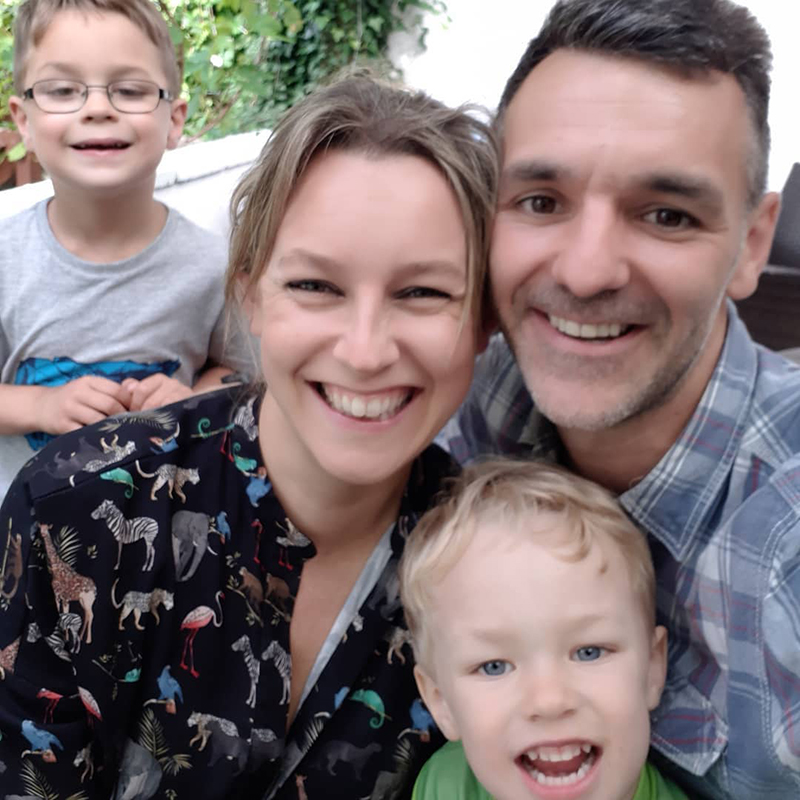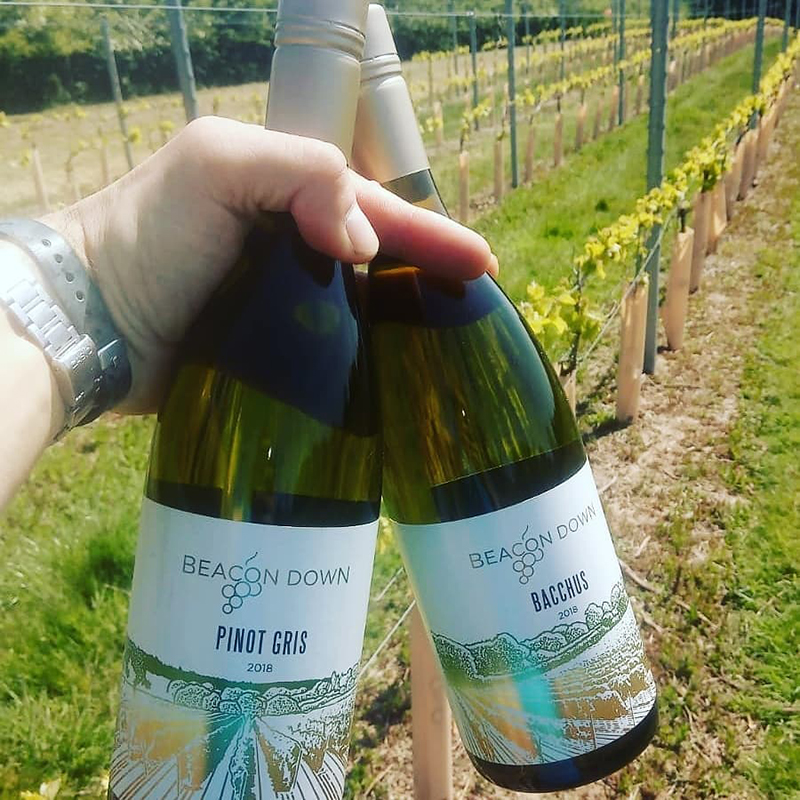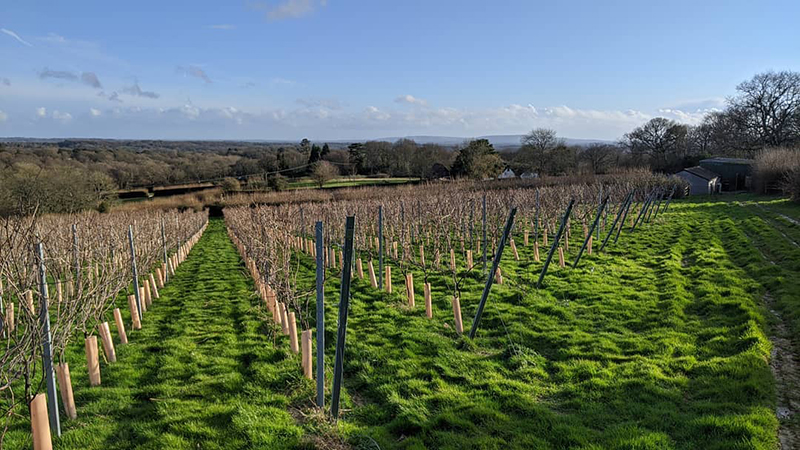When the usual sales channels aren’t available some vineyards have found new ways to keep customers spending at the virtual cellar door.
It’s been a month of learning and one that the UK certainly won’t forget anytime soon. Vineyards have been doing their best to keep revenues coming in during a lockdown and support their communities, with some creative ways to sell wine within social distancing rules.
The length of the lockdown and changes to people’s spending and social habits mean the future is unclear, but Brits have certainly put their money where their mouth is when it comes to stocking their homes with wine. Vineyard Magazine has been speaking to growers about the changes they have seen when retailing their own cases. Here three vineyards tell their stories – both the good and the bad – of new opportunities since panic buying and the lockdown hit.
Ovens Farm Vineyard, Lincolnshire
Simon White runs Ovens Farm Vineyard in Louth, Lincolnshire, with his wife Bridget and has seen a huge spike in demand for his wine – that he happily delivers locally himself – in March.
“We set up the web sales about six months ago in response to requests from customers,” he tells us. “Our main commercial outlet is through Winteringham Fields, a Michelin starred restaurant just north of us. We were getting an awful lot of sales from people who would generally try it on a Saturday night and call us on Sunday morning to buy a case.
“It worked really well for us and a lot of people were asking if they could just buy online to have it delivered. It ticks along as we were doing about a case a week but the majority of our sales were still from the cellar door. When this kicked off, we closed the cellar door for obvious reasons but carried on with online sales and deliveries.
“The only thing we have added locally is personal deliveries. I’ve just dropped a case of wine off with a lady this morning. We delivered locally about nine cases this week, where people have emailed to ask if they can just pick up a case and we’ve said it’s not a problem, we’ll deliver it to you and leave it on the doorstep with an invoice and you can pay us by BACS.
“That’s working really well for us because people are talking locally and saying ‘Simon will drop some wine through.’ While people are homeschooling it seems to be quite popular!”
Although sales from the Ovens Farm Vineyard are typically modest, the number of orders had increased dramatically when we spoke just days into the UK-wide lockdown.
“We’re not big sellers, we’re a very small vineyard. We’ve probably gone from an average of one a week to selling six cases,” White said. “For us that’s a big increase, we have put one or two posts out on Instagram and Facebook to say we’re doing that. Whether this is short term or continues, I’m not sure.”
However, the closure of restaurants will likely have a knock-on affect for the Whites, with a large portion of their wine being sold to Winteringham Fields in North Lincolnshire. “Winteringham Fields would normally take eight cases a month from us because it’s one of the wines on its pairing menu and I believe we’re the only white wine you can have by the glass in the restaurant.
“What they do for us is fantastic and we, up until this point, have gained a huge amount of exposure having our wine on their wine list. People try it blind and then buy it from us by the case, and I think that’s going to start to hurt soon. We’ve got a lot of stock in store, it is going to be interesting to see how it goes. Personally, we’re in a lucky position that we farm as well and the vineyard is a large hobby on the side of the main business. What is a concern is the amount of stock, we’re going to start bottling 2019 soon and have a large amount of 2018 still.”
White’s next challenge will be picking, if lockdown continues later into the year.
He explains: “Most of the season I’m fairly happy with because I do most of the work myself. We have a lady who helps with the tucking up and the tying down, which we are hoping can continue as we’re pretty isolated in the vineyard.
“My biggest concern if this continues is the picking. Our pickers are all local volunteers, we don’t pay anyone for picking. We basically put on a nice lunch for everyone and they take home a couple of bottles of wine each at the end of the day. We generally pick for about eight days in total over a six-week period, but we need about 15 people a day for each of those days. I think without the enticement of a good lunch and a social occasion, people might not want to.”
Flint Vineyard, Norfolk
Hannah Witchell, owner of Flint Vineyard in Norfolk, took advantage of a quirk of their farm to offer a drive through option for contact free wine collections when the country entered the early stages of movement restrictions and social distancing.
“We’d already decided we were going to sell some wine out of the tasting room window, and we thought we could do a drive through instead of letting people in the shop,” she said. “It’s just the setup of our farm that perfectly allows for a vehicle to drive in through one gate, pass the tasting room window, pick up what they want and then drive a loop. I think it was Juliette who runs our tasting room who came up with the idea as a bit of a joke!
“It was a bit of a different angle on it, and instead of saying we’re selling out of the tasting room window we could call it a drive through. Then we had the idea of offering a 15-mile meal deal, which is sort of what we offer for our lunch – local produce, meats, cheeses and artisan bread. We thought we would offer that paired with one of our wines, and that was the most popular thing – most people wanted that when they arrived.”
Unfortunately, changes to rules about travelling have meant the drive through at Flint Vineyard has closed – for now. It’s proved a popular draw and Hannah thinks it could well return in the future.
“Things have changed a bit since we first did that, we’ve decided it’s probably not ethical to encourage people out of their house. It was incredibly popular though, a lot of people were buying the meal deals as Mothers’ Day presents so they could leave them outside their mums’ doors. We hadn’t even thought of that but everyone else did!” she said.
“We think that will have to be a bit of a one-off for now, but I think we’ll definitely do it in the future because people loved it. Everyone who drove up said “this is hilarious!” and we had fun doing it. It was nice to do something fun, particularly at the moment.
“We had about 40 cars over the Friday night and Saturday morning. We’re in a really quiet, rural location so we were really pleased with that. A lot more people know about our wine now, too, we just put it on social media – in fact it was our most popular post ever on Facebook.”
The wine is still going out though, Witchell continued: “We’re still doing deliveries but I think that’s it for the drive through. I don’t usually take my lead from McDonald’s but as they’ve closed their drive through I don’t think we can really carry on.
“We’ve had our online shop from the beginning but, to be honest, it’s never been a massive part of our business. However, last week we sold a lot of wine!
“We did put out a post saying that we had a Comfort Case where we were selling four bottles of Bacchus and two Charmat in a mixed case. We don’t usually do mixed cases, it’s usually individual bottles, but we sold absolutely loads of them. I’m not sure if it was the fact it was a mixed case or the name, but we had our best ever online sales week last week – better than Christmas.”
Does this mean that Flint Vineyard will be putting more focus on its online sales in future?
“It’s something we might focus on a bit more in the future! We tend to focus a lot on the tasting room and the tours, selling to people who are in front of us, but I think we’ll give the online sales more attention.
“Everything helps at the moment but this is going to have a huge impact on our business. Usually we do very well on a Saturday, we tend to have about 50 people coming on tours. We do one in the morning with lunch and one in the afternoon for six months and we’ve just expanded our tasting room to double our capacity to put on more midweek tours. It is going to make a massive impact, but I think anything we can do to offset that with online sales will help. There are a lot of businesses in much worse positions though so we’re grateful we’ve got something. It’s strange times but not all bad.”
Beacon Down, East Sussex
Alice and Paul from Beacon Down Vineyard chose to sell up in London and buy a plot in East Sussex five years ago. Beacon Downs is a family-focussed operation, especially with the kids now home too. The owners still work other jobs outside the vineyard, which has been a bit of a lifeline for them during the lockdown.
They too have seen wine drinkers heading to their website to keep their racks topped up, and a push on their social media accounts has had a positive effect. In response to the lockdown they added a special offer of free delivery for local orders or nationwide for those over £40.
“I’m not sure how unusual it is but both Paul and I have other jobs, we’re not at the stage where we can go full time with the vineyard quite yet,” Alice tells us. “The site is 18 acres, we’ve got three fields, and then about 11 of it is under vine, not including headlands. We’ve got 9,500 vines. On a good year at full production we’re at 10-12,000 bottles. Enough with tours and food to be commercial but we’re not quite there yet.
“Generally, we’ve got two still whites, our sparkling and a medium sweet Reisling, as well. I think we’re the only people doing a still Reisling in the country.
“Our first ever sparkling wine only came online just before Christmas, so in terms of the volume and building up activity in the vineyard we’re not at full production yet. We only planted in 2015, so to still pay the mortgage and look after our children – that sort of thing – we both have other jobs. From the perspective of we’ll get through it and still pay our bills, we’ll be fine. If we were completely reliant on the vineyard, I think we would be more worried.”
Unfortunately, like many vineyards, the lockdown means that Beacon Down’s summer events have all been cancelled and the vineyard can’t be opened for tours.
“We make a lot of our money at summer events in and around Sussex every weekend. At all those events we’ll sell a shedload of wine and we really rely on it. It’s a really great way of meeting people we wouldn’t normally engage with. Obviously every single one of those has been cancelled.
“In terms of the online sales, our social media has definitely helped. The online sales have been really good in the last couple of weeks, so I can’t complain about that! It’s just sustaining it in the absence of other income streams over the summer. I feel like in these times there’s a bit of a movement around supporting local shops as well as stocking up in Tescos. We’re definitely seeing the benefit of that.”
Alice is positive about the future and hopes that the restrictions will be lifted enough to allow them to open the vineyard later in the summer.
“The other thing that’s sort of dropped off is we were starting to line-up a couple of export deals. Although we’re not saying these won’t happen, they’ve gone a bit quiet for the time being,” she explains.
“Unfortunately, we’re not eligible for any of the small business grants that are happening because we’re so small we’re not even in the business rates system. In order to qualify for these grants people are getting of £10,000 or £25,000 you have to be at least eligible for small business rates relief or rural business rates relief.
“The activity we have at the vineyard, a lot of it is off site, and our buildings are agricultural buildings rather than a shop or something like that, so we don’t qualify for those grants that would see us through the summer.”
It might seem fairly gloomy, however, it would be fair to add that our conversation with Beacon Down was in the third week of lockdown compared to the previous vineyards just days in. The extra demand through its online shop has been a welcome addition, though.
Alice adds: “We planted May 2015, the first harvest was October 2017, so we had our first still wines sort of early summer 2018, a Bacchus and a Pinot Gris, and that’s all we had to sell during 2018. It was around this time that we also added our website and online shop.
“Christmas is obviously really, really busy, we were really keen to get our sparkling online for that, then no one is drinking in January so it’s just awful. We didn’t really do any promotion around Valentine’s Day on social media and we’d expect at this time of year sales to ramp up, but it’s been particularly strong.”

